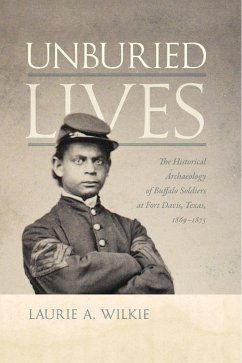According to the accounts of two white officers, on the evening of November 20, 1872, Corporal Daniel Talliafero, of the segregated Black 9th cavalry, was shot to death by an officer's wife while attempting to break into her sleeping apartment at the military post of Fort Davis, Texas. Historians writing about Black soldiers serving in the West have long accepted the account without question, retelling the story of Daniel Talliafero, the thwarted "rapist."
In Unburied Lives Wilkie takes a different approach, demonstrating how we can "listen" to stories found in things neglected, ignored, or disparaged-documents not consulted, architecture not studied, material traces preserved in the dirt. With a focus on Fort Davis, Wilkie brings attention to the Black enlisted men and non-commissioned officers. In her archaeological accounting, Wilkie explores the complexities of post life, racialized relationships, Black masculinity, and citizenship while also exposing the structures and practices of military life that successfully obscured these men's stories for so long.
In Unburied Lives Wilkie takes a different approach, demonstrating how we can "listen" to stories found in things neglected, ignored, or disparaged-documents not consulted, architecture not studied, material traces preserved in the dirt. With a focus on Fort Davis, Wilkie brings attention to the Black enlisted men and non-commissioned officers. In her archaeological accounting, Wilkie explores the complexities of post life, racialized relationships, Black masculinity, and citizenship while also exposing the structures and practices of military life that successfully obscured these men's stories for so long.
Dieser Download kann aus rechtlichen Gründen nur mit Rechnungsadresse in A, D ausgeliefert werden.









